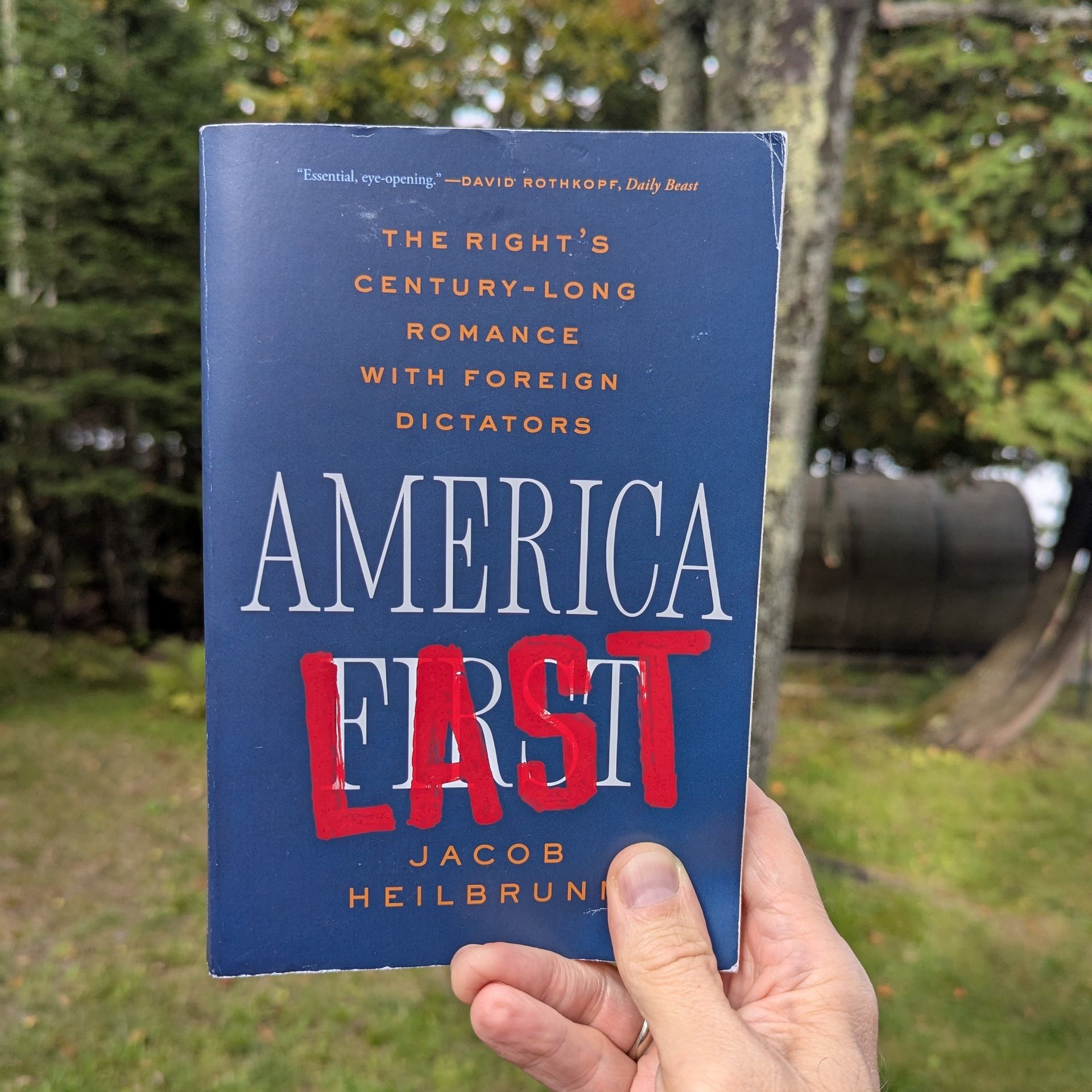
[The topic of Jacob Heilbrunn’s 2024 book America Last is the history of fascination with foreign dictators among some on the American Right. Strong men from Germany’s Kaiser Wilhelm at the turn of the twentieth century up to Hungary’s Viktor Orban today have received praise, support, and alliances with right-wing groups and politicians in America. Speaking of strongmen, today’s book review title comes from the 1987 Rick Astley hit It Would Take A Strong, Strong Man. You can see the music video for Astley’s hit song here on YouTube.]
America Last is Jacob Heilbrunn’s book-length argument that the political right in America has been fascinated by foreign dictators and strong men for more than a century. He draws together a sweeping set of facts to illustrate his argument and does so in a mostly engaging way (though the book does drag a bit in the middle).
There’s a bit of a gap, at least as far as mainstream conservatives are concerned, in the mid-twentieth century. As Heilbrunn himself acknowledges, the Cold War was a time when both sides of the political aisle were united in the fight against the spread of communism. Both sides felt it would be better to have democracy take root amongst our allies, even as they acknowledged the realpolitik belief that in the fight against “godless communism” they wanted allies whether they were democracies or not. They really weren’t going to be too fussy about how those allies conducted themselves in their own nations.
That era of unity across the aisle lasted from the 1950s through the end of the Vietnam War and President Carter’s subsequent shift in the focus of American foreign policy to human rights above all. That focus waned somewhat under President Reagan, who championed a renewed fight against communism that lasted until the fall of the Berlin Wall in 1989. President Bush the Younger co-opted the focus on human rights and the desire for the spread of democracy (which would be the guarantor of those rights), in his Global War of Terror. In that war the neoconservatives favored the notion of nation-building and planting the seeds of democracy in Iraq, which did not go so well for them.
Nevertheless, Heilbrunn is able to marshal an impressive timeline of the Right’s support for dictators. He starts before the US entry into World War I, with America on the sidelines. Here Heilbrunn focuses on newspaper columnist H.L. Mencken, a curmudgeon if there ever was one, and a fervent fan of the German Kaiser. Kaiser Wilhelm was a racist nationalist who despised democracy and did all he could to restore the Devine Right of the Kaiser to rule Germany as he saw fit.

American journalist and author Jacob Heilbrunn is the editor of The National Interest and a nonresident senior fellow at the Atlantic Council’s Eurasia Center. He is the author of They Were Right: The Rise of the Neocons. He is a keen observer of the American Right whose work has appeared in the New York Times, the Wall Street Journal, Foreign Affairs, the Weekly Standard and more. (Photo source: https://nationalinterest.org/profile/jacob-heilbrunn )
Would it surprise you to know that in America, “Kaiser Bill”, as they called him, was viewed by the right as a wronged figure, who stood up for traditional values that the Western powers were vilifying? On the right, it was Woodrow Wilson (a racist himself) who was the threat to world peace, not the Kaiser.
Mencken wasn’t much of a fan of democracy himself and was fascinated by the German aristocracy. He claimed to be a descendent of that aristocracy himself. His work propounding the arguments for Germany and against Britain helped sway American opinion in favor of neutrality.
That work also echoes across the following century. The notion expressed today that Vladimir Putin is a misunderstood figure in the West, who is leading a country intent on championing traditional values that the West vilifies, is a very direct echo.
Of course, there’s a whole century between Mencken’s embrace of the Kaiser and the Trumpists embrace of Putin, during which Heilbrunn lays out right wing infatuation with Mussolini and Hitler. It was then that “America First” as a slogan first became popular, among leading figures in America who pushed America to remain neutral in the second World War, while secretly being in the sway of the German Fuhrer. Anyone familiar with Rachel Maddow’s podcast Ultra and subsequent book Prequel will find many of the same characters she talked about covered here.
In the years of realpolitik, the romance didn’t altogether disappear. Instead, it moved further to the right, where it surfaced in the work of such recognizable conservative luminaries as William F. Buckley Jr., Pat Buchanan and Jeanne Kirkpatrick.
Buchanan was Communications Director for Richard Nixon. A pugnacious man with a firm belief in his own words and opinions, Buchanan called in the spring of 1980 for a return to America First. He became one of the first figures tagged with the term “paleoconservative”, a contrast with the “neoconservatives” who became prominent in the aftermath of the Vietnam War and whose prominence peaked during the Iraq War. Buchanan’s run for president in 1992 against the incumbent George H. W. Bush helped push the neocons aside. That presidential run set the stage for the rise of Donald Trump.
Among other things, Buchanan was one of the founders of The American Conservative, a publication in which many of Heilbrunn’s own articles have appeared. That’s one of the reasons to pay attention to this analysis. Heilbrunn has worked with some of the leading conservative commentators and figures of the last twenty years. He knows his subject.
There are arguments to be made about the romance of some on the American Left with dictators, and those arguments would have as much truth to them as Heilbrunn’s book does about the Right. They don’t diminish the message behind this book, and it’s meaning for us in America today.
RATING: Four Stars ⭐⭐⭐⭐
RATING COMMENTS: Heilbrunn offers an informed and incisive overview of the American Right’s infatuation with dictators and autocrats over the last 100 years. A worthwhile read for anyone still trying to understand where Trumpism came from.
WHERE I GOT MY COPY: I picked up a copy of the paperback edition of this book at O’Hare Airport last fall. It was meant to help occupy my time on a long-haul flight, but instead I think I distracted myself with movies on the in-flight entertainment system. So, this book got pushed onto my to-be-read pile, from which I picked it up again this month.
